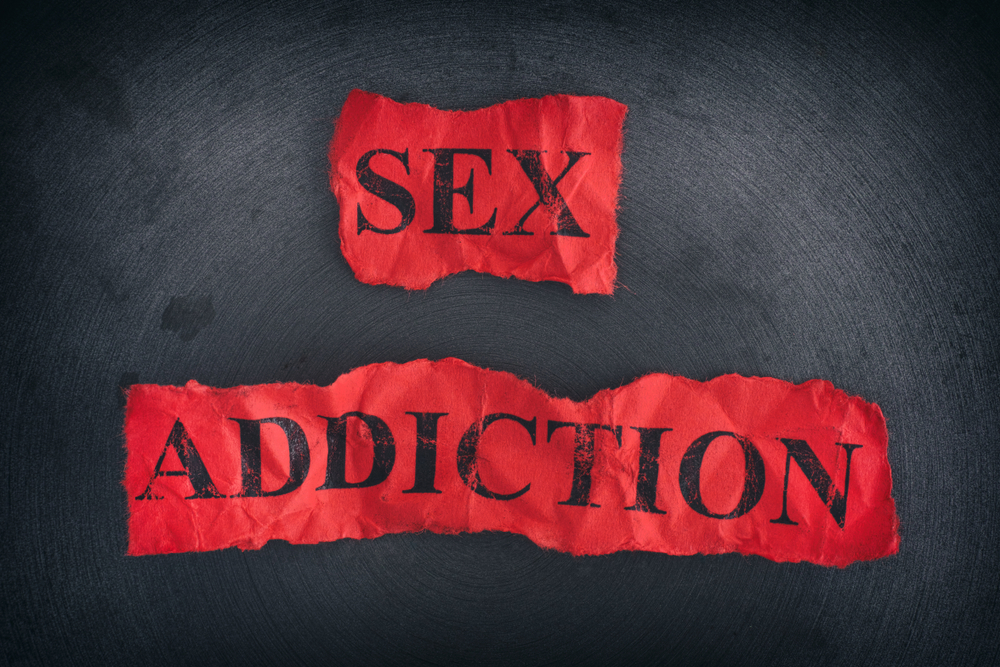Last Updated:
August 4th, 2025
Sex Addiction | Symptoms, Effects and Causes
Sex is a fundamental aspect of many of our lives and romantic relationships. However, when your sexual thoughts and behaviours spiral out of control, you may be suffering from sex addiction. Sex addiction isn’t as widely discussed as others, but it can be just as damaging. The important thing is to know which sex addiction signs and symptoms to look for, as well as the harm it can cause. This can help you get professional sex addiction support as soon as possible.

What is sex addiction?
One simple sex addiction meaning is a compulsive need for sexual activity regardless of the consequences. This could mean constantly watching porn, frequently changing sexual partners, masturbating more than usual or participating in dangerous sexual behaviours.
Sex addiction can be a standalone issue or occur concurrently with other addictions like pornography and love addiction, as well as other mental health conditions. 1 in 25 people suffer from sex addiction, with 80% being men. This group is often drawn to sexual objectification through means like prostitution, voyeurism, pornography and anonymous sex. The remaining 20% are women who may use sex as a tool for control or engage in activities like sexual pain exchange, role-playing and seduction.
How does sex addiction develop?
The development of sex addiction starts in the brain’s reward system. When you engage in sexual activities, this part of the brain is activated, releasing chemicals that include endorphins – your brain’s natural high. These endorphins are incredibly potent, almost like heroin on a molecular level, making the pleasure from sexual activity intensely rewarding. It is this overwhelming sense of pleasure that can lead someone down the path to sex addiction.
Like any addiction, trouble starts when sex becomes a quick fix for pleasure. Over time, this constant quest for gratification leads to physical changes in the brain as it adapts to accommodate the surge of endorphins. This adjustment causes your subconscious mind to prioritise sexual activity above all else, increasingly demanding more intense and frequent sexual encounters or fantasies to achieve satisfaction.
Struggling with an addiction? If you are ready to seek help, reach out to us today, and a member of our compassionate team will help you find the best option for starting your recovery journey.
Do I have a sex addiction?
Like all types of behavioural addiction, sex addiction is crafty and can easily convince both you and others that nothing is wrong. After all, if something feels good, how could it possibly be harmful? That is why recognising these signs of sex addiction is so important:
- Your mind is constantly filled with thoughts of sex.
- You engage in sexual acts more often than you mean to or want to.
- Your attempts to limit or stop your sexual activity have all failed.
- A significant portion of your time goes into looking for sexual partners.
- You continue with your sexual behaviours even when they lead to serious problems like relationship breakdowns or health issues.
- Feeling unable to have sex makes you frustrated, anxious or angry.
- You have had to increase your sexual activity to get the same feelings of pleasure that you used to.
Spotting these sex addiction symptoms early is very important. It will allow you to get expert sex addiction help immediately to prevent harmful consequences.
What causes a sex addiction?
The process of addiction might follow a general pattern, but the triggers for each person can differ greatly. Typically, it is a mix of the following influences that culminate in sex addiction for most people:
The harms caused by sex addiction
The fallout from sex addiction is often underestimated, but it can be severe. If sexual cravings go unmet, there can be a sharp decrease in key neurotransmitters in the brain, essential for maintaining mental health. This can cause symptoms of depression, anxiety or more severe conditions like psychosis. These unmet desires can even manifest physically because the areas of the brain responsible for processing sexual desire and pain are linked.
Addiction often distorts what a healthy sexual relationship looks like, setting unrealistic expectations that are hard to meet. 27% of sufferers reported sexual dysfunction while others had problems in their personal relationships due to ongoing denial, lies and trust issues.
Sex addiction can also greatly increase the chances of contracting a sexually transmitted infection and of putting yourself in dangerous situations.
How to stop a sex addiction?
Recovery from sex addiction often starts with a detox phase where you completely cut out sexual activity or sexual content like pornography. This can be very tough and, in some cases, can even produce drug-like withdrawal symptoms.
To effectively manage these symptoms and make real progress, it is crucial to get help from a professional behavioural addiction rehab programme which offers expert support and guidance.
The NHS may have some resources for dealing with sex addiction, though they are usually fairly limited. If you are looking for more comprehensive help, there are many private rehabilitation centres across the country equipped to assist you in overcoming sex addiction. These facilities provide specialised programmes and ongoing support, which is crucial for long-term success.
Get professional sex addiction help today
If you have decided to break free from sex addiction, you have taken a major step towards a new life. Addiction Helper can link you with leading treatment programmes and sex addiction recovery centres up and down the UK. Get in touch with us and let our seasoned team help you find the best options for your recovery.
Our compassionate team are ready and available to take your call, and guide you towards lasting the lasting addiction recovery you deserve.
Frequently Asked Questions
(Click here to see works cited)
- WebMD. “WebMD Sex and Relationships Center: Sex Advice for Intimacy, Sexual Health, and a Healthy Love Life.” WebMD, https://www.webmd.com/sex-relationships/default.htm. Accessed 14 February 2025.
- Primrose Lodge. “Sex/Love Addiction | Definition, Symptoms & Effects.” Primrose Lodge, 10 February 2025, https://www.primroselodge.com/behavioural-addictions/sex-love/. Accessed 14 February 2025.
- Recovery Lighthouse. “Sex & Love Addiction | Effects & Treatment.” Recovery Lighthouse, 27 January 2025, https://www.recoverylighthouse.com/addiction/behavioural/sex-love/. Accessed 14 February 2025.
- Carnes, Patrick, D. Nonemaker, and N. Skilling. “Gender differences in normal and sexually addicted populations.” American Journal of Preventive Psychiatry and Neurology 3.16.23 (1991).
- University of Cambridge. “Brain activity in sex addiction mirrors that of drug addiction.” ScienceDaily. ScienceDaily, 11 July 2014. <www.sciencedaily.com/releases/2014/07/140711153327.htm>.


